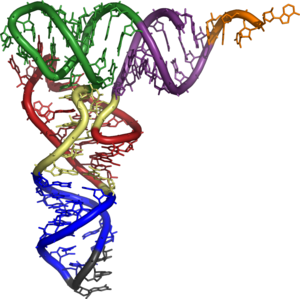.NET Bio
 | |
| Original author(s) | Microsoft Research |
|---|---|
| Developer(s) | Outercurve Foundation |
| Repository | github |
| Written in | C# |
| Operating system | Linux, macOS, Windows |
| Platform | .NET Framework, Mono |
| Type | Bioinformatics and genomics library |
| License | Apache License 2.0 |
| Website | web |
.NET Bio is an open source bioinformatics and genomics library created to enable simple loading, saving and analysis of biological data. It was designed for .NET Standard 2.0 and was part of the Microsoft Biology Initiative in the eScience division.
History[]
.NET Bio was originally built and released by Microsoft Research under the name Microsoft Biology Foundation (MBF) and was later repackaged and released by the Outercurve Foundation as a fully public and open source project under the Apache License 2.0.[1]
Capabilities[]
The library consists of a set of object-oriented classes written in C# to perform common bioinformatic tasks such as:
- Read and write standard alignment and sequence-oriented data files such as FASTA and GenBank.
- Access online web services such as NCBI BLAST to search known databases for sequence fragments.
- Algorithms for local and global alignments.
- Algorithms for sequence assembly, including a parallel DeNovo assembler implementation.[2]
Even though the library itself is written in C#, it may be used from any .NET compatible language and has samples of various usages including from IronPython scripting.
See also[]
- Genome Compiler
- Open Bioinformatics Foundation
- BioJava, BioPerl, BioPython, BioRuby
- Bioclipse
References[]
- ^ "MBF Becomes .NET Bio". 2011-10-18.
- ^ Thareja Gaurav; Vivek Kumar; Mike Zyskowski; Simon Mercer; Bob Davidson (2011). PadeNA: A parallel de novo assembler. Proceedings of the International Conference on Bioinformatics Models, Methods and Algorithms. pp. 196–203. doi:10.5220/0003164301960203. ISBN 978-989-8425-36-2.
External links[]
- .NET software
- Software that uses Mono
- Bioinformatics software
- Free and open-source software
- Microsoft free software
- Software using the Apache license